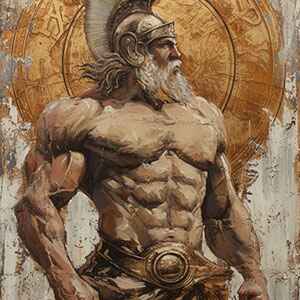Leto
In Greek mythology, Leto is a Titaness and the mother of the twin deities Apollo and Artemis. Her story involves significant aspects of motherhood, perseverance, and the challenges faced by a mortal woman in the divine realm. Here are key aspects of Leto in Greek mythology:
Parents: Coeus & Phoebe
Lover: Zeus
Children: Apollo, Artemis

Parentage: Leto is the daughter of the Titans, Coeus and Phoebe, making her a member of the Titan generation.
Lover of Zeus: Leto caught the attention of Zeus, the king of the gods, and they became lovers. Their union resulted in the birth of Apollo and Artemis.
Persecution by Hera: Hera, Zeus's wife and queen of the gods, was known for her jealousy and often targeted Zeus's mistresses and their offspring. Hera's wrath was directed at Leto, who was pregnant with Zeus's children.
Delos and Birth of Apollo: Hera forbade Leto to give birth on solid ground. In her search for a safe place, Leto found the floating island of Delos. With the consent of Poseidon, the island became rooted, and Leto gave birth to Apollo and Artemis there.
Protection by Eileithyia: Eileithyia, the goddess of childbirth, aided Leto during the labour and ensured the safe delivery of Apollo and Artemis.
Apollo's Achievements: Leto's son Apollo went on to become one of the most important Olympian deities associated with music, prophecy, healing, and the sun.
Artemis's Role: Leto's daughter Artemis became the goddess of the hunt, wilderness, and wild animals. She is often depicted as a skilled archer and a protector of young women.
Cult and Worship: Leto did not have a major cult following in ancient Greece, but she was honoured in connection with her children's cults, particularly those of Apollo and Artemis.
Role in Divine Family: Leto is a member of the Titan generation, making her one of the ancient divine beings. Her position as the mother of Apollo and Artemis aligns her with the Olympian pantheon.
Legacy: Leto's story serves as a testament to the challenges faced by mortal women who became involved with the gods. Her perseverance in finding a safe place to give birth reflects the strength and resilience of motherhood.
Roman Equivalent: In Roman mythology, Leto is identified with Latona.
Leto's narrative, while not as prominent as some other figures in Greek mythology, is significant in its portrayal of the hardships faced by mortal women entangled in divine affairs. Her association with the birth of Apollo and Artemis adds depth to the mythology surrounding these important Olympian deities.
Immediate Family
Quick Facts
- Leto is the daughter of Titans Coeus and Phoebe.
- She became the lover of Zeus.
- Hera persecuted Leto during her pregnancy.
- Leto gave birth to Apollo and Artemis on the island of Delos.
- Eileithyia, the goddess of childbirth, protected Leto during labor.
- Apollo became an important Olympian deity.
- Artemis became the goddess of the hunt.
- Leto is not extensively worshipped but honored in connection with her children's cults.
- She is a member of the Titan generation and the mother of Apollo and Artemis.
- Leto's story reflects the challenges faced by mortal women involved with gods.
- In Roman mythology, Leto is identified with Latona.
Further Reading
Art &
Architecture
Ancient Greek art and architecture, with its harmonious proportions and timeless elegance, continue to inspire awe and admiration millennia later.
Discover
Greek Mythology & Mythical Characters
Greek mythology, a rich tapestry of gods, heroes, and mythical creatures, captivates the imagination with its tales of love, betrayal, and epic adventures that delve into the depths of the human psyche.
Discover
Ancient Greek History
Ancient Greek history, marked by remarkable achievements in democracy, philosophy, and warfare, shaped the foundation of Western civilization, leaving an indelible legacy of innovation and cultural influence that continues to resonate to this day.
Discover
Ancient Greek Olympics
The ancient Greek Olympics, held in Olympia every four years, celebrated athleticism, unity, and cultural pride, serving as a testament to the enduring spirit of competition and excellence that transcends time and borders.
Discover
Ancient Greek Wars
Ancient Greek wars, such as the Persian Wars and the Peloponnesian War, were pivotal conflicts that shaped the course of history, highlighting the struggle for power, independence, and the clash of civilizations in the ancient Mediterranean world.
Discover
Ancient Greek Culture and Society
Ancient Greek culture and society, characterized by its emphasis on art, philosophy, and civic engagement, fostered a vibrant intellectual and social landscape where innovation flourished, democracy thrived, and the pursuit of knowledge and excellence was celebrated as fundamental values of civilized life.
Discover

